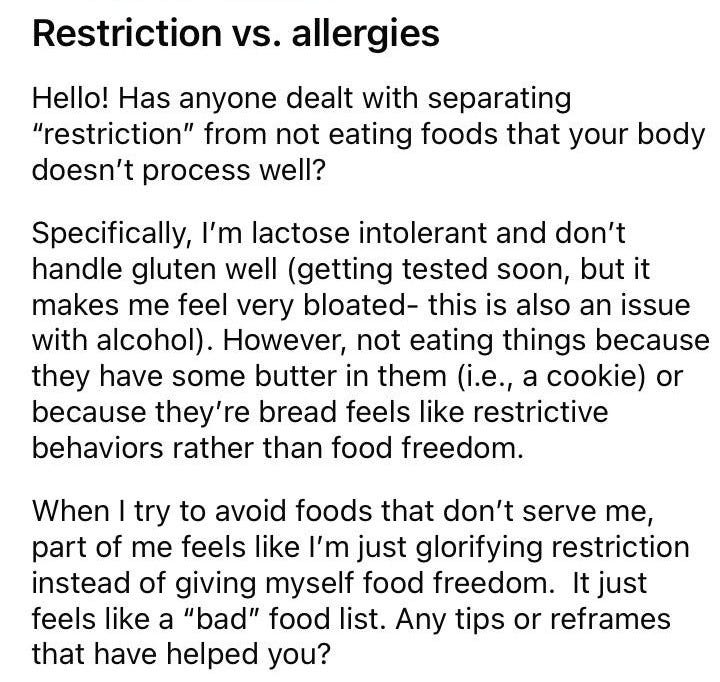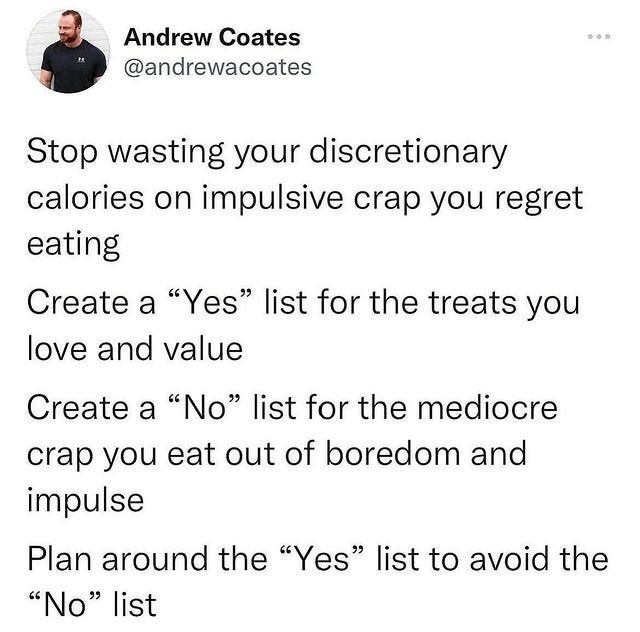What food restriction is — and isn't
Maybe the voice in your head rejecting another bowl of ice cream isn’t a diet culture demon at all.
I’ll be lowered into my grave still thinking about this tweet:

It represents an insidious problem lurking within the well-intentioned anti-diet culture movement: We’re so preoccupied with pointing out harmful concepts that can be of a piece with diet culture that we can’t see when they actually are not.
You are, quite literally, not restricting if you eat another bowl of ice cream, even if a little diet culture demon in your head told you that you shouldn’t. Having that little voice in your head (since diet culture put it there) doesn’t make you a “restrictor,” which apparently is tantamount to “baby seal clubber” in some corners of the internet. There are voices in the anti-diet/intuitive eating/HAES-aligned spaces who suggest that to have a positive relationship to food, one must never even think about curbing what they consume — restriction, they say, is necessarily indicative of disordered eating, self-harm, and a doomed dieting mindset.
Restricting ourselves from eating more food doesn’t mean we’re restricting ourselves from eating enough food.
Restriction is not always or inherently a harmful thing. We can apply shades of the same principle to eating as we do to drinking alcohol or scrolling TikTok for four hours: Sometimes we may choose to moderate our consumption if we believe that excessiveness will ultimately have a deleterious effect. I’ll restrict myself from having a third cocktail since I’m almost 34 and hangovers are a 48-hour affair. I’ll restrict myself from having another slice of pizza once I’ve had a couple, even if my tongue-brain thinks it wants another before my actual brain registers the others, because pizza has diminishing returns. Restricting ourselves from eating more food doesn’t mean we’re restricting ourselves from eating enough food.
If you know there won’t be adverse effects from having more of something, think the benefits outweigh the drawbacks, or just don’t care, go for it. If you constantly hold yourself back from food you truly want and will be happy and satisfied to have — in the name of “being good” per your temporary diet — that might weigh heavy on your well-being and lead to binges. But maybe sometimes you just don’t think it’s worth it to indulge every craving or the possibility of more food.
Maybe the voice in your head rejecting another bowl of ice cream isn’t a diet culture demon at all. Maybe it’s just you, knowing how food makes you feel.
Earlier this summer, readers sent me “ask me anything” questions. One said:
“When does the food guilt go away? I know all about diet culture and how insidious it is and the basic tenets of intuitive eating, but restrictive thoughts still constantly pop into my head. I know that my eating behaviour is disordered and I’m trying to challenge that but most of the time I end up feeling immense guilt and it kind of becomes a cycle that I don’t really know how to stop.”
Reader, I know this struggle. I cannot answer when food guilt goes away. I can only point to what helped me: Therapy (and self-reflection, writing, journaling) to unpack where it comes from. This post by Alana Kessler illuminates the “why” of food guilt.
I’m not sure if this reader feels guilt about eating what they feel they “shouldn’t,” or about not eating some foods (maybe both). It’s maddening how diet culture can elicit guilt if we eat abundantly and often, but anti-diet culture can do the same if we don’t welcome all foods at all times. To wit, this post:
That person is so concerned about “glorifying restriction” that they’re anxious about not eating foods that they’re allergic to.
People, we’ve lost the plot. No one is going to reach food freedom by eating things that make them shit themselves.
The idea that any self-imposed limitations around food are harmful restrictive behaviors teaches people that if they have a mental list of foods they don’t eat because they’re binge triggers or low-nutrition foods they de-prioritize, then they’ve not yet reached the nirvana of “food freedom,” they’ve not yet elevated their consciousness enough to see that there are no “bad foods.” This increases people’s fear, guilt, and shame that they’re doing something wrong around food and eating.
(As a person with binge eating tendencies, I think lists can be valuable, actually:)
A gentle suggestion: Take some time to deeply consider how you eat. Do you feel nourished and at peace? Do you think you could pretty easily eat this way most of the time, forever, and feel sane? If so, you’re probably fine, even if you restrict some things sometimes.
Reducing the frequency or volume of distressing or harmful behaviors — binge eating, drinking, smoking, heavy social media use, whatever — causes temporary discomfort. Any positive change does.
While I still have my disordered moments around food, I’m certainly more at peace now than I was in my early 20s. To get here, I had to reduce my caloric intake, because I had binge eating disorder and was routinely eating triple the daily calories I eat now while doing a fraction of a fraction of the exercise. I had to realize that indulging every temporary craving resulted in physical and emotional turmoil. I eat what my body needs, but I’m also eating far less than I used to.
Reducing the frequency or volume of distressing or harmful behaviors — binge eating, drinking, smoking, heavy social media use, whatever — causes temporary discomfort. Any positive change does. But temporary discomfort in pursuit of a long-term positive effect does not equal self-harm. Consider the degree of distress you feel: If you’re constantly hungry (and irritable, weak, and low-energy) because you’re restricting the calories you need to function and feel satisfied, you’re cultivating destructive habits. If you’re adjusting how much you eat and notice positive changes alongside temporary discomfort, you might see that in a couple weeks that discomfort has disappeared.
[Peter Attia’s recent podcast episode with Michael Easter, author of The Comfort Crisis, is a compelling listen about experiencing discomfort and what to do with it.]
Allow me to release you from guilt:
Maybe you don’t always honor your hunger because you realize that some hunger is only a temporary stress or boredom-driven craving (or your hunger cues have been hijacked). Maybe you turn down donuts at work, even though they smell damn good, because they’re not a super “worth it” experience and you’d rather eat steak frites later. Maybe you want to fit back into your jeans after a luxurious vacation so you’ve got to reduce your caloric intake back to where it usually is.
None of these things makes you a low down, no good, dirty rotten restrictor. They make you a human trying to figure out how to be comfortable in your body and with your habits. To this end, you might indulge various anti-diet concepts. You might also restrict them.
Did you enjoy this post? Please share it with a friend or on social media. Body Type is also on Instagram.
I’d also love if you left me a comment with your thoughts.








Loved this essay, and it's so true. I laughed out loud at, "People, we’ve lost the plot. No one is going to reach food freedom by eating things that make them shit themselves." I feel like we desperately need to teach our population better critical thinking skills, or put a bajillion asterisks after every post, because apparently many people can't seem to understand *when a message is not for them.* Truly, how skewed is the messaging out there that people who have food intolerances and allergies think they are restricting food in a bad way?? It boggles the mind.
This reminds me of an IG story I recently saw...the woman talked about how she was so concerned with being "body positive" that she minimized her growing lower abdomen for months. Because of the messaging that "women have lower body fat and that's normal" and "being concerned about weight gain is always bad." Turns out she had fibroids the size of a grapefruit, and actually, being concerned with a change in body shape/size is not necessarily disordered diet culture thinking!
It's crazy out there...we need the pendulum to swing back toward the middle, because this extreme doesn't seem to be serving anybody any better than the diet culture extreme is.
Really enjoyed this essay, thank you!!